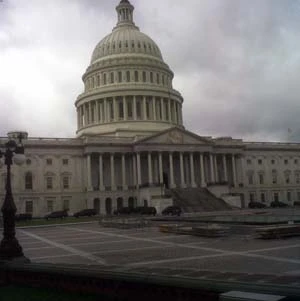
Wednesday, April 13 – The ‘Hill’
I had no idea how this day was going to end. I had four congressional appointments along with spending free time at the WE ARE GOLF exhibit in the Rayburn Office Building and an evening plane flight back to Chicago.
In hearing horror stories from different people, either your ‘Hill’ visits will go smoothly or they will argue with you on every point you try to make. My mother's cousin was a lobbyist for a trade council about 20 years ago so I contacted her upon receiving my invitation to join the GCSAA contingent. I did have one thought that helped me somewhat, I was a constituent of the district of the people I would be speaking with. And, as one lobbyist I struck up a conversation with said, “you aren’t some plain bloodsucker like me representing the banking industry.” Nice huh?
Getting to play lobbyist for a day was another experience that in college or even 5 years ago never would have dreamed of. Following breakfast and making the taxi trip over to the Rayburn Office Building where the We Are Golf exhibit was located, the committee began to scatter to our respective appointments.
Two of the biggest issues that I wanted to talk about in my ‘Hill’ visits were about the message about golf; its economic value to the United States and H.R. 872 – The Reducing Regulatory Burdens Act of 2011 (NPDES). My main talking points for each visit were as follows:
- Golf is a $75 billion-a-year industry in the U.S.
- More than 2 million people are employed because of golf in the U.S.
- 75% of golf in the U.S. is public
- When Hurricane Katrina hit the Gulf Coast, federal disaster relief funding exempted golf lumping us in with massage/tattoo parlors, liquor stores, and gambling establishments.
- When flooding ravaged parts of Iowa in 2009, again golf was exempt from disaster relief even though the IRS believes golf courses are small business. These Iowa course owners had trouble securing loans and even took on second jobs to rebuild their family’s investment.
These startling statistics were unknown to all who I shared them with throughout the day. Hopefully, people will start to believe that golf is not just an elitist sport and actually provides families with homes, food, and sustainability.
The second issue I discussed or tried my best was H.R. 872 – The Reducing Regulatory Burdens Act of 2011. H.R. 872 would negate the need for a federal Clean Water Act (CWA) National Pollutant Discharge Elimination System (NPDES) permit for pesticide applications on, over or near waters of the U.S. Experts have already cited that FIFRA already requires applicators to utilize pesticides properly and further open up golf courses to unneeded litigation. This bill had already passed through the House and hence my hope for the day was to gain some ground in my later Senate visits.
Latest from Golf Course Industry
- From the publisher’s pen: Conscientious of a bigger role
- Bernhard and Company partners with Laguna Golf Phuket
- Terre Blanche showcases environmental stewardship
- VIDEO: Introducing our December issue
- Bernhard and Company introduces Soil Scout
- Nu-Pipe donates to GCSAA Foundation’s Centennial Campaign
- GCSAA enhances golf course BMP tool
- Melrose leadership programs sending 18 to 2026 GCSAA Conference and Trade Show





